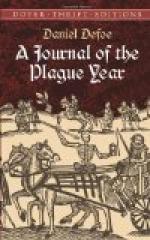But we perceived the infection kept chiefly in the out-parishes, which being very populous, and fuller also of poor, the distemper found more to prey upon than in the city, as I shall observe afterwards. We perceived, I say, the distemper to draw our way, viz., by the parishes of Clarkenwell, Cripplegate, Shoreditch, and Bishopsgate; which last two parishes joining to Aldgate, Whitechappel, and Stepney, the infection came at length to spread its utmost rage and violence in those parts, even when it abated at the western parishes where it began.
It was very strange to observe that in this particular week, from the 4th to the 11th of July, when, as I have observed, there died near 400 of the plague in the two parishes of St Martin and St Giles-in-the-Fields only, there died in the parish of Aldgate but four, in the parish of Whitechappel three, in the parish of Stepney but one.
Likewise in the next week, from the 11th of July to the 18th, when the week’s bill was 1761, yet there died no more of the plague, on the whole Southwark side of the water, than sixteen. But this face of things soon changed, and it began to thicken in Cripplegate parish especially, and in Clarkenwell; so that by the second week in August, Cripplegate parish alone buried 886, and Clarkenwell 155. Of the first, 850 might well be reckoned to die of the plague; and of the last, the bill itself said 145 were of the plague.
During the month of July, and while, as I have observed, our part of the town seemed to be spared in comparison of the west part, I went ordinarily about the streets, as my business required, and particularly went generally once in a day, or in two days, into the city, to my brother’s house, which he had given me charge of, and to see if it was safe; and having the key in my pocket, I used to go into the house, and over most of the rooms, to see that all was well; for though it be something wonderful to tell, that any should have hearts so hardened in the midst of such a calamity as to rob and steal, yet certain it is that all sorts of villainies, and even levities and debaucheries, were then practised in the town as openly as ever—I will not say quite as frequently, because the numbers of people were many ways lessened.
But the city itself began now to be visited too, I mean within the walls; but the number of people there were indeed extremely lessened by so great a multitude having been gone into the country; and even all this month of July they continued to flee, though not in such multitudes as formerly. In August, indeed, they fled in such a manner that I began to think there would be really none but magistrates and servants left in the city.
As they fled now out of the city, so I should observe that the Court removed early, viz., in the month of June, and went to Oxford, where it pleased God to preserve them; and the distemper did not, as I heard of, so much as touch them, for which I cannot say that I ever saw they showed any great token of thankfulness, and hardly anything of reformation, though they did not want being told that their crying vices might without breach of charity be said to have gone far in bringing that terrible judgement upon the whole nation.




